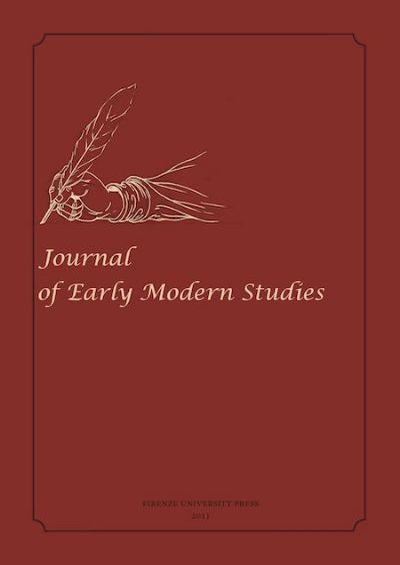Volume 16 (2026) of the Journal of Early Modern Studies will re-examine the relationship between material space and literary production in early modern Europe. Literary production is here defined as including prose, sermons, poetry, drama, letters, and diaries, written for both private and/or public audiences. In its reconsideration of both space and place, broadly defined, the volume will offer a reassessment of both late medieval and early modern writings about and within space and will offer fresh ways of understanding the complex relationship between individuals and their environments (material, imagined, or otherwise) during this period. The editors particularly welcome submissions which engage with subversion and the deconstruction of formal and informal power structures, and encourage submissions from scholars of underrepresented backgrounds.
Contributions that examine the literary output or spaces traditionally excluded from modern scholarship are also encouraged. The French philosophers Michel de Certeau and Henri Lefebvre argue for the relationship between people and spaces (or places) in which space is not a neutral container, but a social product constructed from relationships and interactions between people and objects. Space is defined by the changing interactions between those subjects, while place is determined by their relationship to fixed objects. In recent decades, the humanities have become increasingly interested in the spatial and material aspects of late medieval and early modern literary production. Work by Amanda Flather, Bernhard Klein, Julie Sanders, Paul Stock, Alexandra Walsham, and others has established a foundation for evaluating the rich and multi-layered interplay between materiality and spatiality. Many of these developments have, however, remained within conventional disciplinary boundaries.
This issue seeks to build upon the valuable work highlighted above, broadening the scope of this burgeoning field of research, and invites contributors to consider how studying the relationship between literary production broadly understood and space can help scholars develop fresh perspectives on the influence of the lived environment.
Material culture too continues to attract significant historical attention, and the materiality of texts and of writing, more broadly, also offer avenues of exploration through which to consider the contexts and contents of these texts through attention to media, instruments, and ornamentation. In light of these trends, this volume will foster new discussions about questions such as how the material conditions of writing inform the finished text, how early moderns conceived of their relationship to their environment (natural and manmade), and how this was or was not expressed in – and influenced by – the different spaces and mediums in which they wrote and lived. We invite contributors working across a variety of disciplinary traditions to use these questions as a jumping off point for (re)considering the relationship between writing, material culture, and space/place in the early modern world. As scholars continue to consider the relationship between space and literary production, this volume has the potential to become standard reading for those undertaking future interdisciplinary work on the subject.
Potential subjects include, but are not limited to:
- Travel writing
- Prison writing/writing in exile
- Writing for particular environments (eg. masques, public playhouses, pulpits)
- Nature writing
- Surveying, mapping, chorography, architecture
- The materiality of texts, the material spaces in which texts are produced
- Epistolary writing
- Identity and its relationship to place
- Mobility and access
- Domestic spaces and texts
- Diplomatic texts
- Religious writing
Main deadlines
30 June 2024: Please send your proposal (c. 300 words) and working title to the guest editors (chloe.fairbanks@warwick.ac.uk and catherine.jenkinson@lincoln.ox.ac.uk)
15 July 2024: Notification of proposal acceptance
20 January 2025: Submission of articles to the guest editors
Please note that articles must comply with the editorial norms and must not exceed 10,000 words, including footnotes and bibliography.
Articles may include up to 10 images (for publication they need to be submitted in 600 dpi resolution and with publication permit).
All articles are published in English.
Download (PDF)

